University Assignment: Maria Montessori's Philosophy of Education
VerifiedAdded on 2022/08/26
|18
|4960
|96
Essay
AI Summary
This essay provides a comprehensive overview of Maria Montessori's philosophy of education. It begins with a biographical sketch of Montessori and the groundwork for her educational approach, including her work with developmentally challenged children and the establishment of the Casa dei Bambini. The essay details the core tenets of Montessori education, emphasizing the child-centric approach, the importance of a prepared learning environment, and the concept of the 'absorbent mind.' It outlines the four planes of child development as defined by Montessori, each with its specific characteristics and educational implications. The essay also examines the Montessori curriculum, activities, and materials, highlighting the constructivist framework underlying the approach. Finally, it analyzes the alignment of Montessori's philosophy with constructivism and the theories of Jean Piaget and Lev Vygotsky, offering a well-rounded understanding of her lasting influence on early childhood education. The essay concludes by summarizing the core principles of Montessori's educational philosophy and its enduring relevance.
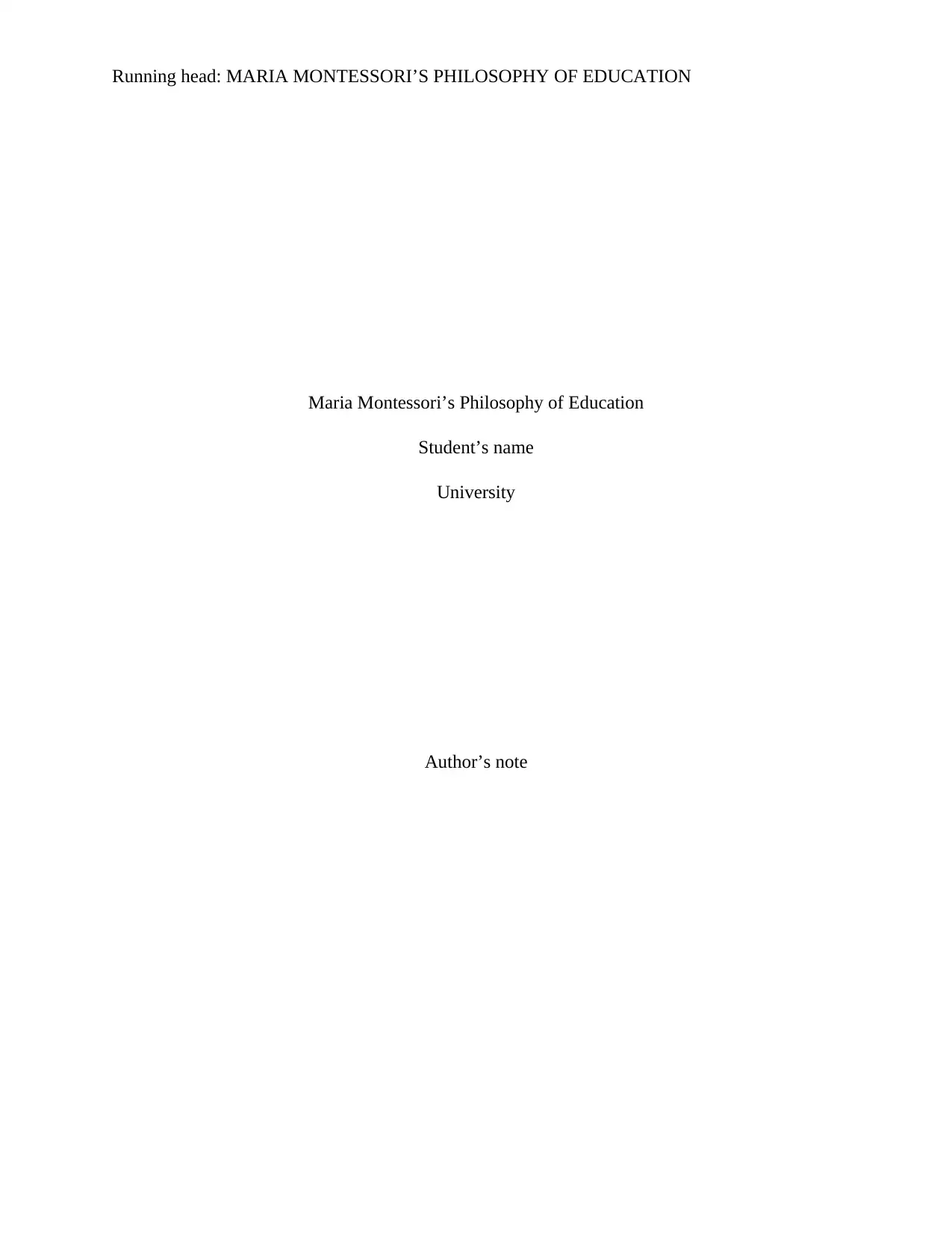
Running head: MARIA MONTESSORI’S PHILOSOPHY OF EDUCATION
Maria Montessori’s Philosophy of Education
Student’s name
University
Author’s note
Maria Montessori’s Philosophy of Education
Student’s name
University
Author’s note
Paraphrase This Document
Need a fresh take? Get an instant paraphrase of this document with our AI Paraphraser
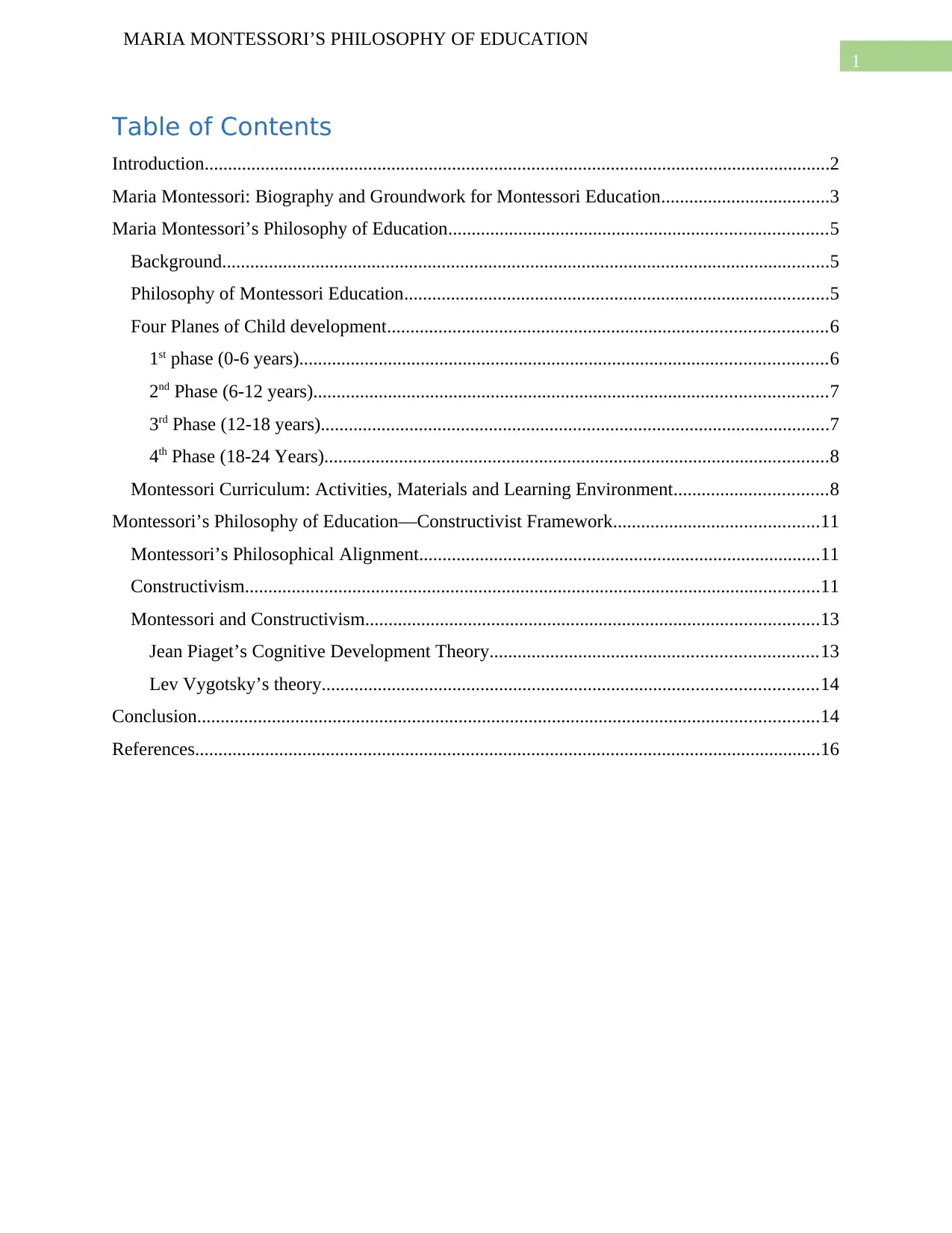
1
MARIA MONTESSORI’S PHILOSOPHY OF EDUCATION
Table of Contents
Introduction......................................................................................................................................2
Maria Montessori: Biography and Groundwork for Montessori Education....................................3
Maria Montessori’s Philosophy of Education.................................................................................5
Background..................................................................................................................................5
Philosophy of Montessori Education...........................................................................................5
Four Planes of Child development..............................................................................................6
1st phase (0-6 years).................................................................................................................6
2nd Phase (6-12 years)..............................................................................................................7
3rd Phase (12-18 years).............................................................................................................7
4th Phase (18-24 Years)............................................................................................................8
Montessori Curriculum: Activities, Materials and Learning Environment.................................8
Montessori’s Philosophy of Education—Constructivist Framework............................................11
Montessori’s Philosophical Alignment......................................................................................11
Constructivism...........................................................................................................................11
Montessori and Constructivism.................................................................................................13
Jean Piaget’s Cognitive Development Theory......................................................................13
Lev Vygotsky’s theory..........................................................................................................14
Conclusion.....................................................................................................................................14
References......................................................................................................................................16
MARIA MONTESSORI’S PHILOSOPHY OF EDUCATION
Table of Contents
Introduction......................................................................................................................................2
Maria Montessori: Biography and Groundwork for Montessori Education....................................3
Maria Montessori’s Philosophy of Education.................................................................................5
Background..................................................................................................................................5
Philosophy of Montessori Education...........................................................................................5
Four Planes of Child development..............................................................................................6
1st phase (0-6 years).................................................................................................................6
2nd Phase (6-12 years)..............................................................................................................7
3rd Phase (12-18 years).............................................................................................................7
4th Phase (18-24 Years)............................................................................................................8
Montessori Curriculum: Activities, Materials and Learning Environment.................................8
Montessori’s Philosophy of Education—Constructivist Framework............................................11
Montessori’s Philosophical Alignment......................................................................................11
Constructivism...........................................................................................................................11
Montessori and Constructivism.................................................................................................13
Jean Piaget’s Cognitive Development Theory......................................................................13
Lev Vygotsky’s theory..........................................................................................................14
Conclusion.....................................................................................................................................14
References......................................................................................................................................16
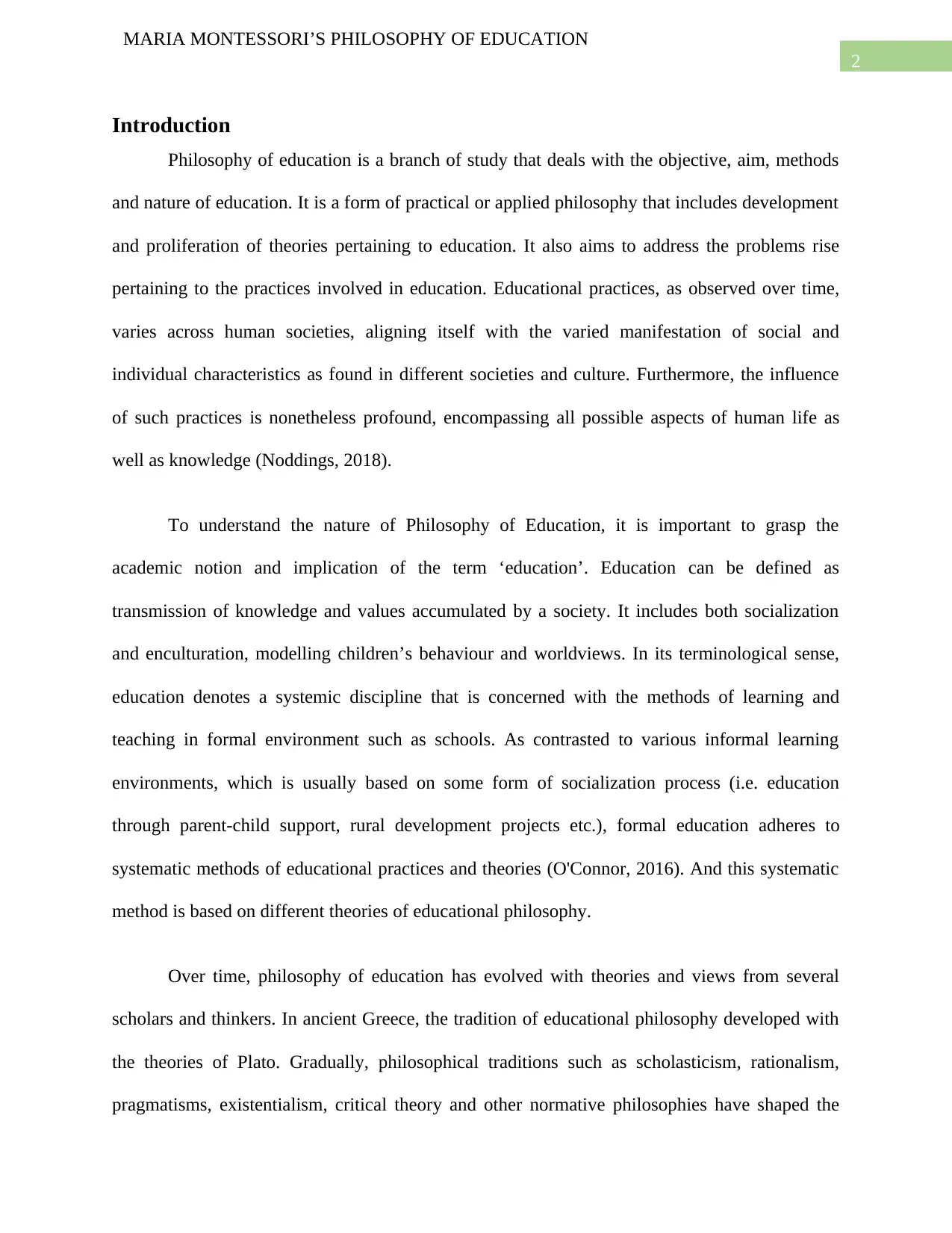
2
MARIA MONTESSORI’S PHILOSOPHY OF EDUCATION
Introduction
Philosophy of education is a branch of study that deals with the objective, aim, methods
and nature of education. It is a form of practical or applied philosophy that includes development
and proliferation of theories pertaining to education. It also aims to address the problems rise
pertaining to the practices involved in education. Educational practices, as observed over time,
varies across human societies, aligning itself with the varied manifestation of social and
individual characteristics as found in different societies and culture. Furthermore, the influence
of such practices is nonetheless profound, encompassing all possible aspects of human life as
well as knowledge (Noddings, 2018).
To understand the nature of Philosophy of Education, it is important to grasp the
academic notion and implication of the term ‘education’. Education can be defined as
transmission of knowledge and values accumulated by a society. It includes both socialization
and enculturation, modelling children’s behaviour and worldviews. In its terminological sense,
education denotes a systemic discipline that is concerned with the methods of learning and
teaching in formal environment such as schools. As contrasted to various informal learning
environments, which is usually based on some form of socialization process (i.e. education
through parent-child support, rural development projects etc.), formal education adheres to
systematic methods of educational practices and theories (O'Connor, 2016). And this systematic
method is based on different theories of educational philosophy.
Over time, philosophy of education has evolved with theories and views from several
scholars and thinkers. In ancient Greece, the tradition of educational philosophy developed with
the theories of Plato. Gradually, philosophical traditions such as scholasticism, rationalism,
pragmatisms, existentialism, critical theory and other normative philosophies have shaped the
MARIA MONTESSORI’S PHILOSOPHY OF EDUCATION
Introduction
Philosophy of education is a branch of study that deals with the objective, aim, methods
and nature of education. It is a form of practical or applied philosophy that includes development
and proliferation of theories pertaining to education. It also aims to address the problems rise
pertaining to the practices involved in education. Educational practices, as observed over time,
varies across human societies, aligning itself with the varied manifestation of social and
individual characteristics as found in different societies and culture. Furthermore, the influence
of such practices is nonetheless profound, encompassing all possible aspects of human life as
well as knowledge (Noddings, 2018).
To understand the nature of Philosophy of Education, it is important to grasp the
academic notion and implication of the term ‘education’. Education can be defined as
transmission of knowledge and values accumulated by a society. It includes both socialization
and enculturation, modelling children’s behaviour and worldviews. In its terminological sense,
education denotes a systemic discipline that is concerned with the methods of learning and
teaching in formal environment such as schools. As contrasted to various informal learning
environments, which is usually based on some form of socialization process (i.e. education
through parent-child support, rural development projects etc.), formal education adheres to
systematic methods of educational practices and theories (O'Connor, 2016). And this systematic
method is based on different theories of educational philosophy.
Over time, philosophy of education has evolved with theories and views from several
scholars and thinkers. In ancient Greece, the tradition of educational philosophy developed with
the theories of Plato. Gradually, philosophical traditions such as scholasticism, rationalism,
pragmatisms, existentialism, critical theory and other normative philosophies have shaped the
⊘ This is a preview!⊘
Do you want full access?
Subscribe today to unlock all pages.

Trusted by 1+ million students worldwide
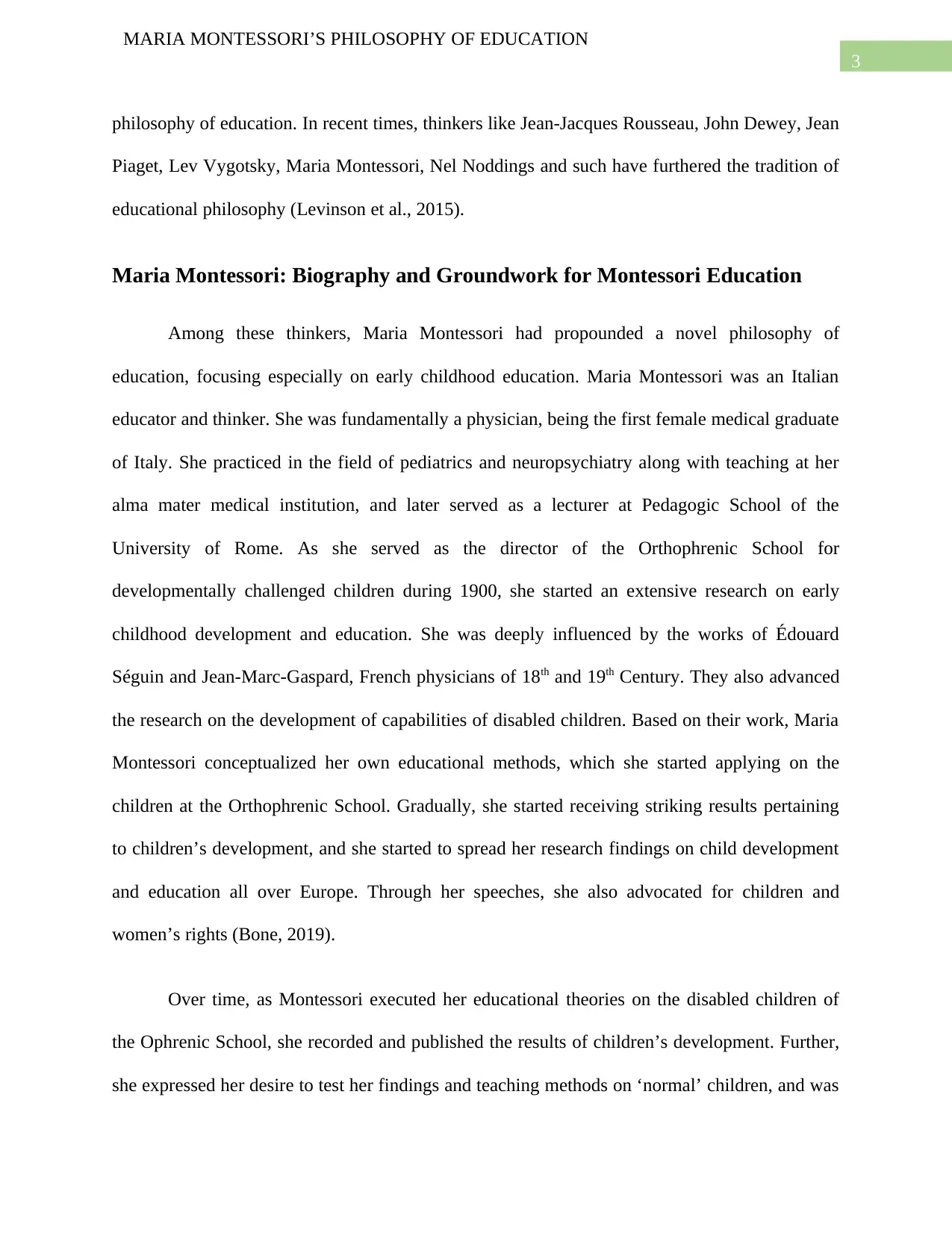
3
MARIA MONTESSORI’S PHILOSOPHY OF EDUCATION
philosophy of education. In recent times, thinkers like Jean-Jacques Rousseau, John Dewey, Jean
Piaget, Lev Vygotsky, Maria Montessori, Nel Noddings and such have furthered the tradition of
educational philosophy (Levinson et al., 2015).
Maria Montessori: Biography and Groundwork for Montessori Education
Among these thinkers, Maria Montessori had propounded a novel philosophy of
education, focusing especially on early childhood education. Maria Montessori was an Italian
educator and thinker. She was fundamentally a physician, being the first female medical graduate
of Italy. She practiced in the field of pediatrics and neuropsychiatry along with teaching at her
alma mater medical institution, and later served as a lecturer at Pedagogic School of the
University of Rome. As she served as the director of the Orthophrenic School for
developmentally challenged children during 1900, she started an extensive research on early
childhood development and education. She was deeply influenced by the works of Édouard
Séguin and Jean-Marc-Gaspard, French physicians of 18th and 19th Century. They also advanced
the research on the development of capabilities of disabled children. Based on their work, Maria
Montessori conceptualized her own educational methods, which she started applying on the
children at the Orthophrenic School. Gradually, she started receiving striking results pertaining
to children’s development, and she started to spread her research findings on child development
and education all over Europe. Through her speeches, she also advocated for children and
women’s rights (Bone, 2019).
Over time, as Montessori executed her educational theories on the disabled children of
the Ophrenic School, she recorded and published the results of children’s development. Further,
she expressed her desire to test her findings and teaching methods on ‘normal’ children, and was
MARIA MONTESSORI’S PHILOSOPHY OF EDUCATION
philosophy of education. In recent times, thinkers like Jean-Jacques Rousseau, John Dewey, Jean
Piaget, Lev Vygotsky, Maria Montessori, Nel Noddings and such have furthered the tradition of
educational philosophy (Levinson et al., 2015).
Maria Montessori: Biography and Groundwork for Montessori Education
Among these thinkers, Maria Montessori had propounded a novel philosophy of
education, focusing especially on early childhood education. Maria Montessori was an Italian
educator and thinker. She was fundamentally a physician, being the first female medical graduate
of Italy. She practiced in the field of pediatrics and neuropsychiatry along with teaching at her
alma mater medical institution, and later served as a lecturer at Pedagogic School of the
University of Rome. As she served as the director of the Orthophrenic School for
developmentally challenged children during 1900, she started an extensive research on early
childhood development and education. She was deeply influenced by the works of Édouard
Séguin and Jean-Marc-Gaspard, French physicians of 18th and 19th Century. They also advanced
the research on the development of capabilities of disabled children. Based on their work, Maria
Montessori conceptualized her own educational methods, which she started applying on the
children at the Orthophrenic School. Gradually, she started receiving striking results pertaining
to children’s development, and she started to spread her research findings on child development
and education all over Europe. Through her speeches, she also advocated for children and
women’s rights (Bone, 2019).
Over time, as Montessori executed her educational theories on the disabled children of
the Ophrenic School, she recorded and published the results of children’s development. Further,
she expressed her desire to test her findings and teaching methods on ‘normal’ children, and was
Paraphrase This Document
Need a fresh take? Get an instant paraphrase of this document with our AI Paraphraser
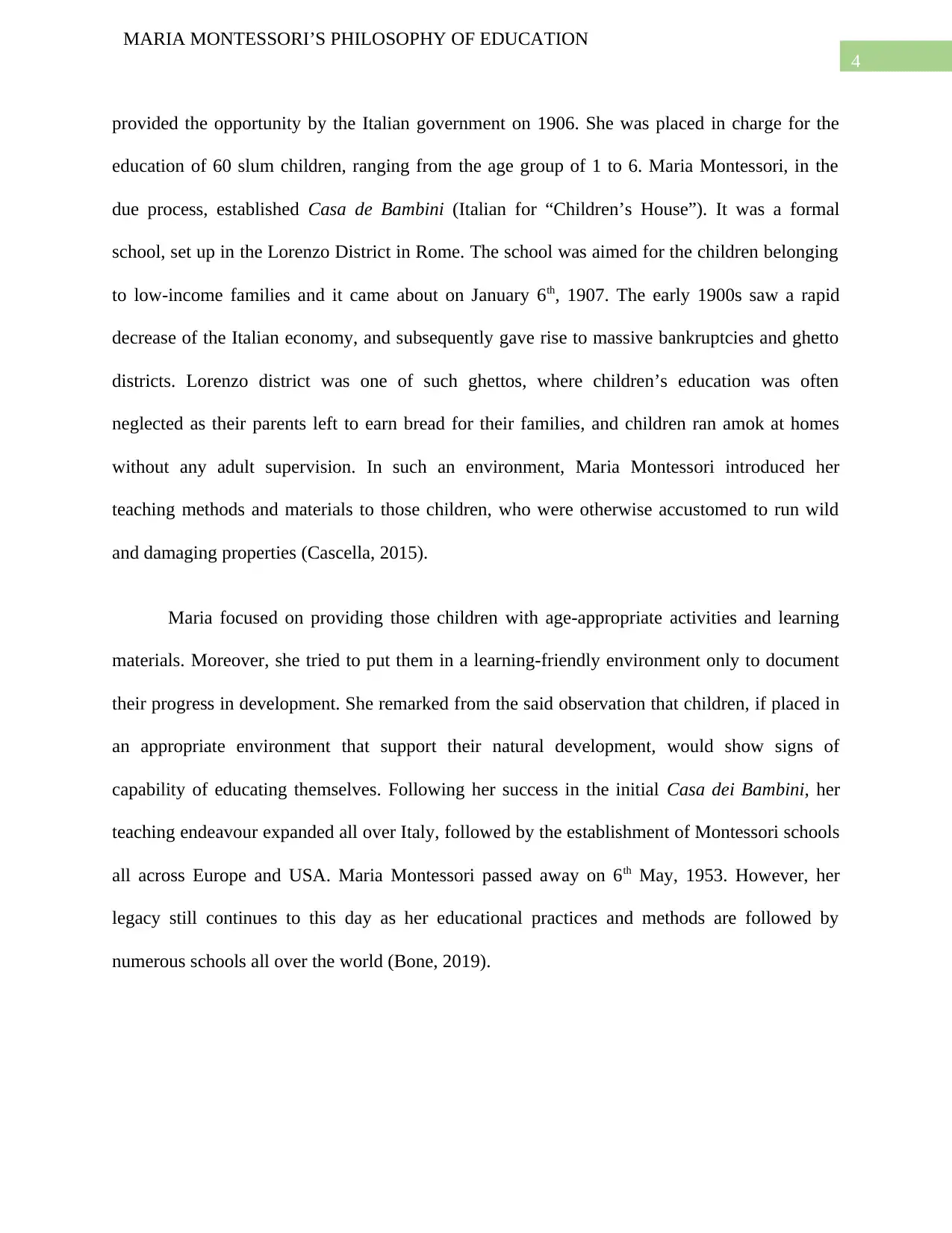
4
MARIA MONTESSORI’S PHILOSOPHY OF EDUCATION
provided the opportunity by the Italian government on 1906. She was placed in charge for the
education of 60 slum children, ranging from the age group of 1 to 6. Maria Montessori, in the
due process, established Casa de Bambini (Italian for “Children’s House”). It was a formal
school, set up in the Lorenzo District in Rome. The school was aimed for the children belonging
to low-income families and it came about on January 6th, 1907. The early 1900s saw a rapid
decrease of the Italian economy, and subsequently gave rise to massive bankruptcies and ghetto
districts. Lorenzo district was one of such ghettos, where children’s education was often
neglected as their parents left to earn bread for their families, and children ran amok at homes
without any adult supervision. In such an environment, Maria Montessori introduced her
teaching methods and materials to those children, who were otherwise accustomed to run wild
and damaging properties (Cascella, 2015).
Maria focused on providing those children with age-appropriate activities and learning
materials. Moreover, she tried to put them in a learning-friendly environment only to document
their progress in development. She remarked from the said observation that children, if placed in
an appropriate environment that support their natural development, would show signs of
capability of educating themselves. Following her success in the initial Casa dei Bambini, her
teaching endeavour expanded all over Italy, followed by the establishment of Montessori schools
all across Europe and USA. Maria Montessori passed away on 6th May, 1953. However, her
legacy still continues to this day as her educational practices and methods are followed by
numerous schools all over the world (Bone, 2019).
MARIA MONTESSORI’S PHILOSOPHY OF EDUCATION
provided the opportunity by the Italian government on 1906. She was placed in charge for the
education of 60 slum children, ranging from the age group of 1 to 6. Maria Montessori, in the
due process, established Casa de Bambini (Italian for “Children’s House”). It was a formal
school, set up in the Lorenzo District in Rome. The school was aimed for the children belonging
to low-income families and it came about on January 6th, 1907. The early 1900s saw a rapid
decrease of the Italian economy, and subsequently gave rise to massive bankruptcies and ghetto
districts. Lorenzo district was one of such ghettos, where children’s education was often
neglected as their parents left to earn bread for their families, and children ran amok at homes
without any adult supervision. In such an environment, Maria Montessori introduced her
teaching methods and materials to those children, who were otherwise accustomed to run wild
and damaging properties (Cascella, 2015).
Maria focused on providing those children with age-appropriate activities and learning
materials. Moreover, she tried to put them in a learning-friendly environment only to document
their progress in development. She remarked from the said observation that children, if placed in
an appropriate environment that support their natural development, would show signs of
capability of educating themselves. Following her success in the initial Casa dei Bambini, her
teaching endeavour expanded all over Italy, followed by the establishment of Montessori schools
all across Europe and USA. Maria Montessori passed away on 6th May, 1953. However, her
legacy still continues to this day as her educational practices and methods are followed by
numerous schools all over the world (Bone, 2019).
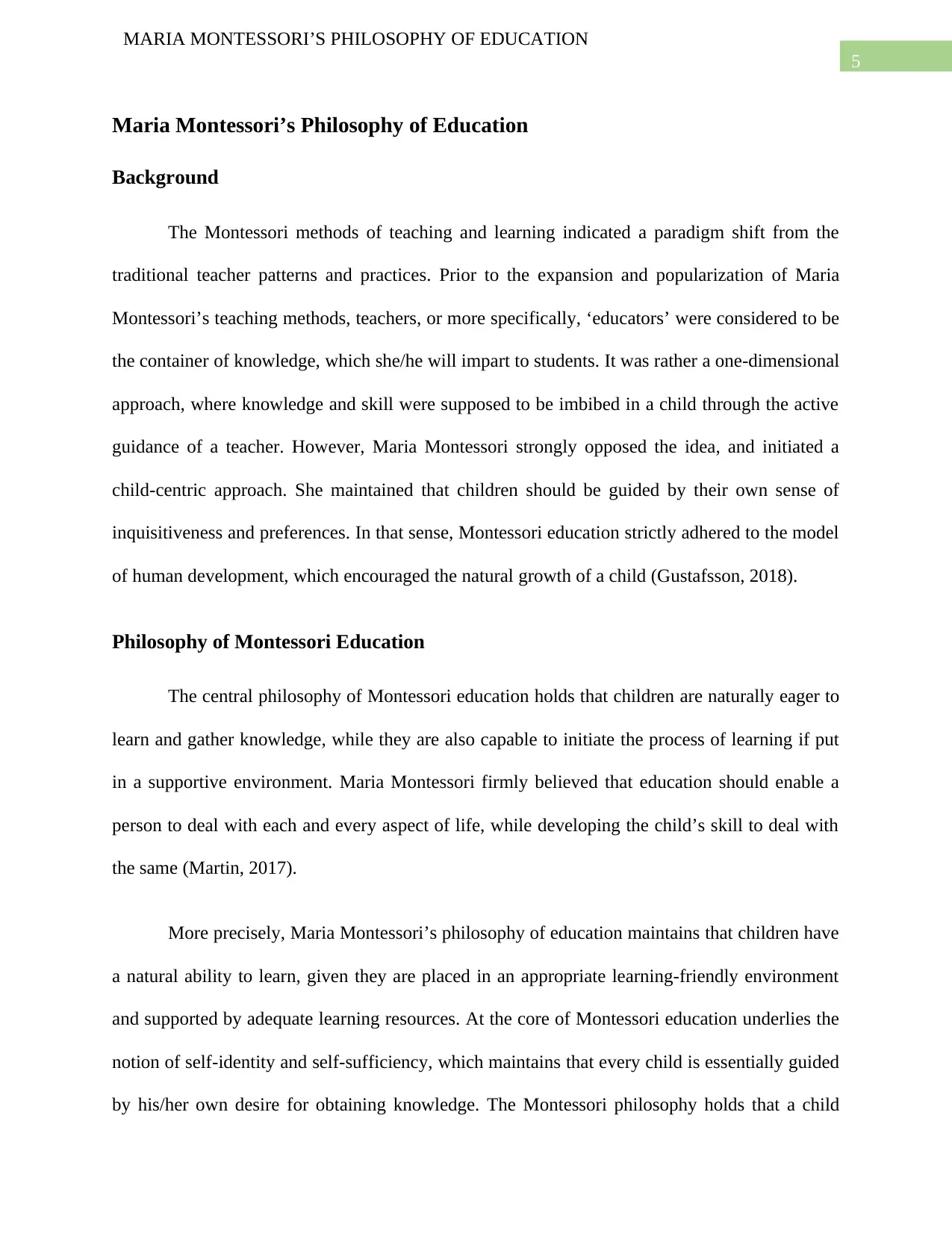
5
MARIA MONTESSORI’S PHILOSOPHY OF EDUCATION
Maria Montessori’s Philosophy of Education
Background
The Montessori methods of teaching and learning indicated a paradigm shift from the
traditional teacher patterns and practices. Prior to the expansion and popularization of Maria
Montessori’s teaching methods, teachers, or more specifically, ‘educators’ were considered to be
the container of knowledge, which she/he will impart to students. It was rather a one-dimensional
approach, where knowledge and skill were supposed to be imbibed in a child through the active
guidance of a teacher. However, Maria Montessori strongly opposed the idea, and initiated a
child-centric approach. She maintained that children should be guided by their own sense of
inquisitiveness and preferences. In that sense, Montessori education strictly adhered to the model
of human development, which encouraged the natural growth of a child (Gustafsson, 2018).
Philosophy of Montessori Education
The central philosophy of Montessori education holds that children are naturally eager to
learn and gather knowledge, while they are also capable to initiate the process of learning if put
in a supportive environment. Maria Montessori firmly believed that education should enable a
person to deal with each and every aspect of life, while developing the child’s skill to deal with
the same (Martin, 2017).
More precisely, Maria Montessori’s philosophy of education maintains that children have
a natural ability to learn, given they are placed in an appropriate learning-friendly environment
and supported by adequate learning resources. At the core of Montessori education underlies the
notion of self-identity and self-sufficiency, which maintains that every child is essentially guided
by his/her own desire for obtaining knowledge. The Montessori philosophy holds that a child
MARIA MONTESSORI’S PHILOSOPHY OF EDUCATION
Maria Montessori’s Philosophy of Education
Background
The Montessori methods of teaching and learning indicated a paradigm shift from the
traditional teacher patterns and practices. Prior to the expansion and popularization of Maria
Montessori’s teaching methods, teachers, or more specifically, ‘educators’ were considered to be
the container of knowledge, which she/he will impart to students. It was rather a one-dimensional
approach, where knowledge and skill were supposed to be imbibed in a child through the active
guidance of a teacher. However, Maria Montessori strongly opposed the idea, and initiated a
child-centric approach. She maintained that children should be guided by their own sense of
inquisitiveness and preferences. In that sense, Montessori education strictly adhered to the model
of human development, which encouraged the natural growth of a child (Gustafsson, 2018).
Philosophy of Montessori Education
The central philosophy of Montessori education holds that children are naturally eager to
learn and gather knowledge, while they are also capable to initiate the process of learning if put
in a supportive environment. Maria Montessori firmly believed that education should enable a
person to deal with each and every aspect of life, while developing the child’s skill to deal with
the same (Martin, 2017).
More precisely, Maria Montessori’s philosophy of education maintains that children have
a natural ability to learn, given they are placed in an appropriate learning-friendly environment
and supported by adequate learning resources. At the core of Montessori education underlies the
notion of self-identity and self-sufficiency, which maintains that every child is essentially guided
by his/her own desire for obtaining knowledge. The Montessori philosophy holds that a child
⊘ This is a preview!⊘
Do you want full access?
Subscribe today to unlock all pages.

Trusted by 1+ million students worldwide
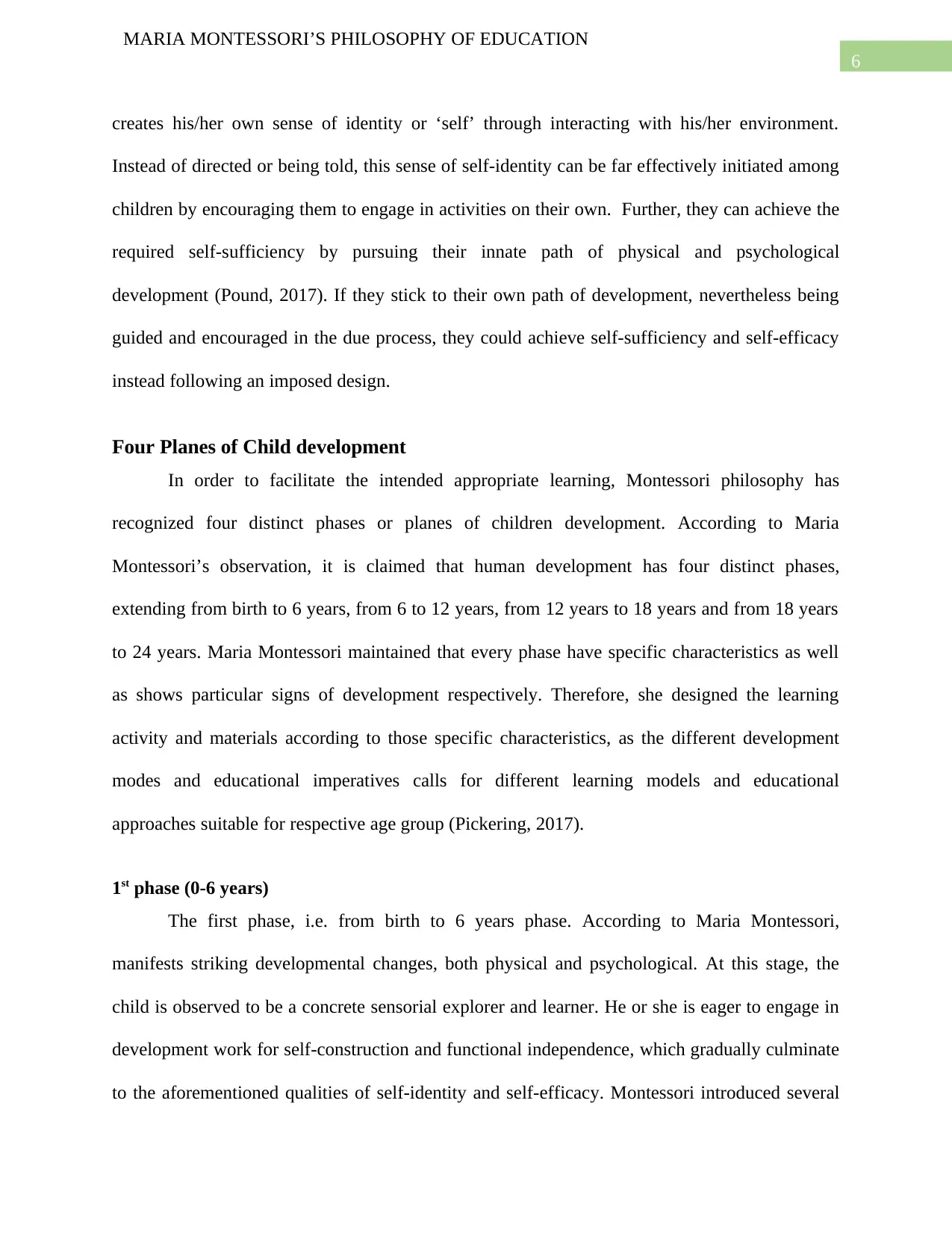
6
MARIA MONTESSORI’S PHILOSOPHY OF EDUCATION
creates his/her own sense of identity or ‘self’ through interacting with his/her environment.
Instead of directed or being told, this sense of self-identity can be far effectively initiated among
children by encouraging them to engage in activities on their own. Further, they can achieve the
required self-sufficiency by pursuing their innate path of physical and psychological
development (Pound, 2017). If they stick to their own path of development, nevertheless being
guided and encouraged in the due process, they could achieve self-sufficiency and self-efficacy
instead following an imposed design.
Four Planes of Child development
In order to facilitate the intended appropriate learning, Montessori philosophy has
recognized four distinct phases or planes of children development. According to Maria
Montessori’s observation, it is claimed that human development has four distinct phases,
extending from birth to 6 years, from 6 to 12 years, from 12 years to 18 years and from 18 years
to 24 years. Maria Montessori maintained that every phase have specific characteristics as well
as shows particular signs of development respectively. Therefore, she designed the learning
activity and materials according to those specific characteristics, as the different development
modes and educational imperatives calls for different learning models and educational
approaches suitable for respective age group (Pickering, 2017).
1st phase (0-6 years)
The first phase, i.e. from birth to 6 years phase. According to Maria Montessori,
manifests striking developmental changes, both physical and psychological. At this stage, the
child is observed to be a concrete sensorial explorer and learner. He or she is eager to engage in
development work for self-construction and functional independence, which gradually culminate
to the aforementioned qualities of self-identity and self-efficacy. Montessori introduced several
MARIA MONTESSORI’S PHILOSOPHY OF EDUCATION
creates his/her own sense of identity or ‘self’ through interacting with his/her environment.
Instead of directed or being told, this sense of self-identity can be far effectively initiated among
children by encouraging them to engage in activities on their own. Further, they can achieve the
required self-sufficiency by pursuing their innate path of physical and psychological
development (Pound, 2017). If they stick to their own path of development, nevertheless being
guided and encouraged in the due process, they could achieve self-sufficiency and self-efficacy
instead following an imposed design.
Four Planes of Child development
In order to facilitate the intended appropriate learning, Montessori philosophy has
recognized four distinct phases or planes of children development. According to Maria
Montessori’s observation, it is claimed that human development has four distinct phases,
extending from birth to 6 years, from 6 to 12 years, from 12 years to 18 years and from 18 years
to 24 years. Maria Montessori maintained that every phase have specific characteristics as well
as shows particular signs of development respectively. Therefore, she designed the learning
activity and materials according to those specific characteristics, as the different development
modes and educational imperatives calls for different learning models and educational
approaches suitable for respective age group (Pickering, 2017).
1st phase (0-6 years)
The first phase, i.e. from birth to 6 years phase. According to Maria Montessori,
manifests striking developmental changes, both physical and psychological. At this stage, the
child is observed to be a concrete sensorial explorer and learner. He or she is eager to engage in
development work for self-construction and functional independence, which gradually culminate
to the aforementioned qualities of self-identity and self-efficacy. Montessori introduced several
Paraphrase This Document
Need a fresh take? Get an instant paraphrase of this document with our AI Paraphraser
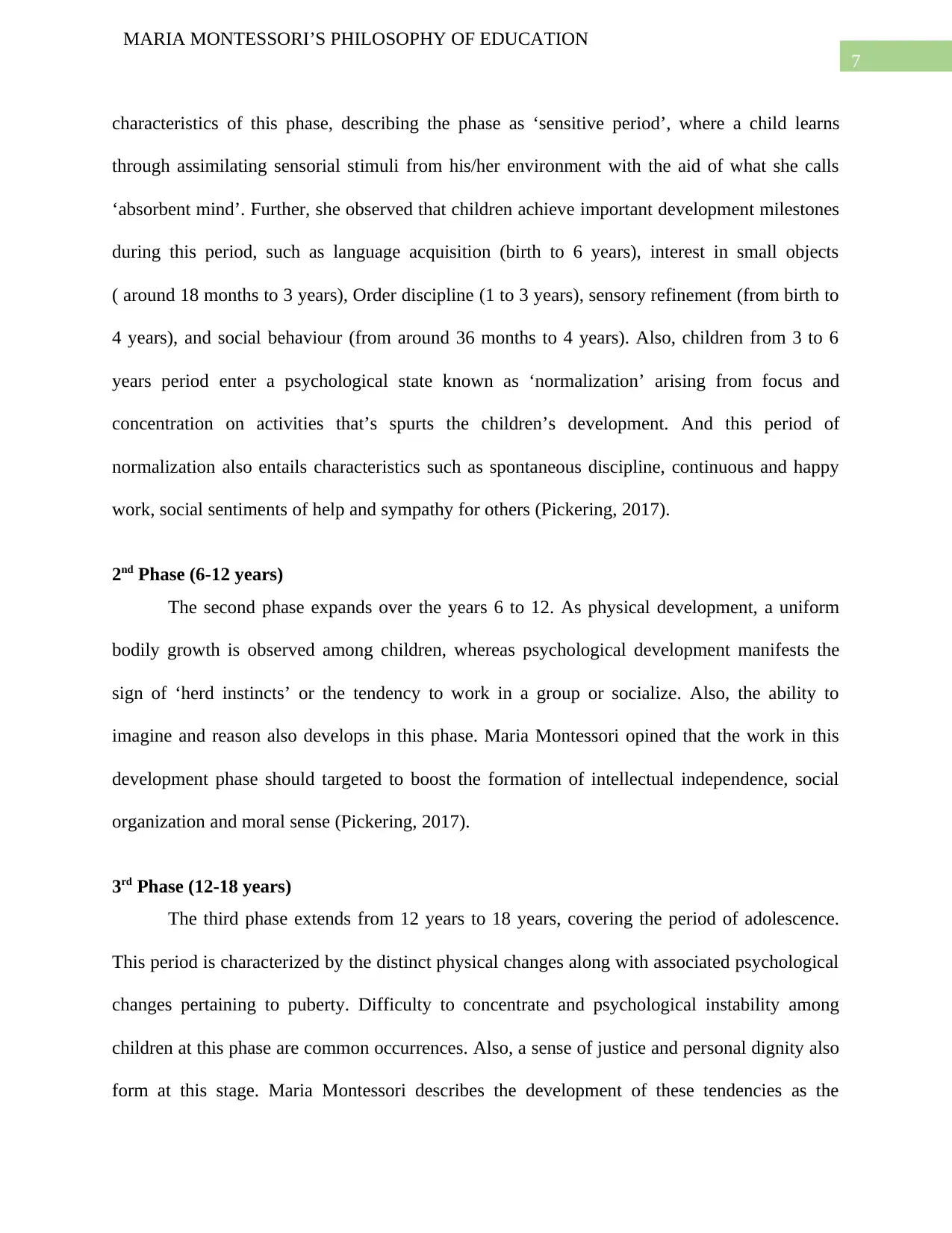
7
MARIA MONTESSORI’S PHILOSOPHY OF EDUCATION
characteristics of this phase, describing the phase as ‘sensitive period’, where a child learns
through assimilating sensorial stimuli from his/her environment with the aid of what she calls
‘absorbent mind’. Further, she observed that children achieve important development milestones
during this period, such as language acquisition (birth to 6 years), interest in small objects
( around 18 months to 3 years), Order discipline (1 to 3 years), sensory refinement (from birth to
4 years), and social behaviour (from around 36 months to 4 years). Also, children from 3 to 6
years period enter a psychological state known as ‘normalization’ arising from focus and
concentration on activities that’s spurts the children’s development. And this period of
normalization also entails characteristics such as spontaneous discipline, continuous and happy
work, social sentiments of help and sympathy for others (Pickering, 2017).
2nd Phase (6-12 years)
The second phase expands over the years 6 to 12. As physical development, a uniform
bodily growth is observed among children, whereas psychological development manifests the
sign of ‘herd instincts’ or the tendency to work in a group or socialize. Also, the ability to
imagine and reason also develops in this phase. Maria Montessori opined that the work in this
development phase should targeted to boost the formation of intellectual independence, social
organization and moral sense (Pickering, 2017).
3rd Phase (12-18 years)
The third phase extends from 12 years to 18 years, covering the period of adolescence.
This period is characterized by the distinct physical changes along with associated psychological
changes pertaining to puberty. Difficulty to concentrate and psychological instability among
children at this phase are common occurrences. Also, a sense of justice and personal dignity also
form at this stage. Maria Montessori describes the development of these tendencies as the
MARIA MONTESSORI’S PHILOSOPHY OF EDUCATION
characteristics of this phase, describing the phase as ‘sensitive period’, where a child learns
through assimilating sensorial stimuli from his/her environment with the aid of what she calls
‘absorbent mind’. Further, she observed that children achieve important development milestones
during this period, such as language acquisition (birth to 6 years), interest in small objects
( around 18 months to 3 years), Order discipline (1 to 3 years), sensory refinement (from birth to
4 years), and social behaviour (from around 36 months to 4 years). Also, children from 3 to 6
years period enter a psychological state known as ‘normalization’ arising from focus and
concentration on activities that’s spurts the children’s development. And this period of
normalization also entails characteristics such as spontaneous discipline, continuous and happy
work, social sentiments of help and sympathy for others (Pickering, 2017).
2nd Phase (6-12 years)
The second phase expands over the years 6 to 12. As physical development, a uniform
bodily growth is observed among children, whereas psychological development manifests the
sign of ‘herd instincts’ or the tendency to work in a group or socialize. Also, the ability to
imagine and reason also develops in this phase. Maria Montessori opined that the work in this
development phase should targeted to boost the formation of intellectual independence, social
organization and moral sense (Pickering, 2017).
3rd Phase (12-18 years)
The third phase extends from 12 years to 18 years, covering the period of adolescence.
This period is characterized by the distinct physical changes along with associated psychological
changes pertaining to puberty. Difficulty to concentrate and psychological instability among
children at this phase are common occurrences. Also, a sense of justice and personal dignity also
form at this stage. Maria Montessori describes the development of these tendencies as the
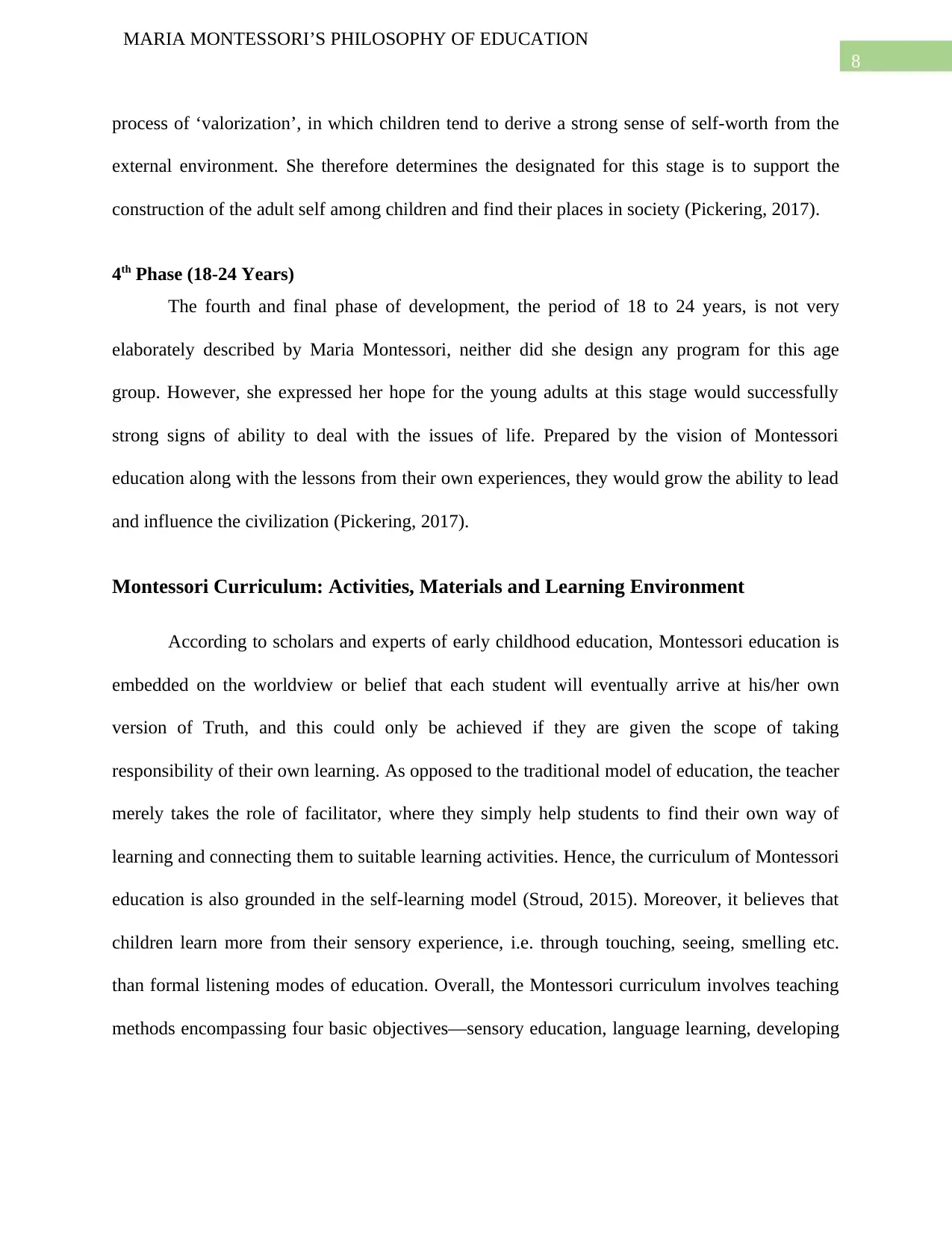
8
MARIA MONTESSORI’S PHILOSOPHY OF EDUCATION
process of ‘valorization’, in which children tend to derive a strong sense of self-worth from the
external environment. She therefore determines the designated for this stage is to support the
construction of the adult self among children and find their places in society (Pickering, 2017).
4th Phase (18-24 Years)
The fourth and final phase of development, the period of 18 to 24 years, is not very
elaborately described by Maria Montessori, neither did she design any program for this age
group. However, she expressed her hope for the young adults at this stage would successfully
strong signs of ability to deal with the issues of life. Prepared by the vision of Montessori
education along with the lessons from their own experiences, they would grow the ability to lead
and influence the civilization (Pickering, 2017).
Montessori Curriculum: Activities, Materials and Learning Environment
According to scholars and experts of early childhood education, Montessori education is
embedded on the worldview or belief that each student will eventually arrive at his/her own
version of Truth, and this could only be achieved if they are given the scope of taking
responsibility of their own learning. As opposed to the traditional model of education, the teacher
merely takes the role of facilitator, where they simply help students to find their own way of
learning and connecting them to suitable learning activities. Hence, the curriculum of Montessori
education is also grounded in the self-learning model (Stroud, 2015). Moreover, it believes that
children learn more from their sensory experience, i.e. through touching, seeing, smelling etc.
than formal listening modes of education. Overall, the Montessori curriculum involves teaching
methods encompassing four basic objectives—sensory education, language learning, developing
MARIA MONTESSORI’S PHILOSOPHY OF EDUCATION
process of ‘valorization’, in which children tend to derive a strong sense of self-worth from the
external environment. She therefore determines the designated for this stage is to support the
construction of the adult self among children and find their places in society (Pickering, 2017).
4th Phase (18-24 Years)
The fourth and final phase of development, the period of 18 to 24 years, is not very
elaborately described by Maria Montessori, neither did she design any program for this age
group. However, she expressed her hope for the young adults at this stage would successfully
strong signs of ability to deal with the issues of life. Prepared by the vision of Montessori
education along with the lessons from their own experiences, they would grow the ability to lead
and influence the civilization (Pickering, 2017).
Montessori Curriculum: Activities, Materials and Learning Environment
According to scholars and experts of early childhood education, Montessori education is
embedded on the worldview or belief that each student will eventually arrive at his/her own
version of Truth, and this could only be achieved if they are given the scope of taking
responsibility of their own learning. As opposed to the traditional model of education, the teacher
merely takes the role of facilitator, where they simply help students to find their own way of
learning and connecting them to suitable learning activities. Hence, the curriculum of Montessori
education is also grounded in the self-learning model (Stroud, 2015). Moreover, it believes that
children learn more from their sensory experience, i.e. through touching, seeing, smelling etc.
than formal listening modes of education. Overall, the Montessori curriculum involves teaching
methods encompassing four basic objectives—sensory education, language learning, developing
⊘ This is a preview!⊘
Do you want full access?
Subscribe today to unlock all pages.

Trusted by 1+ million students worldwide
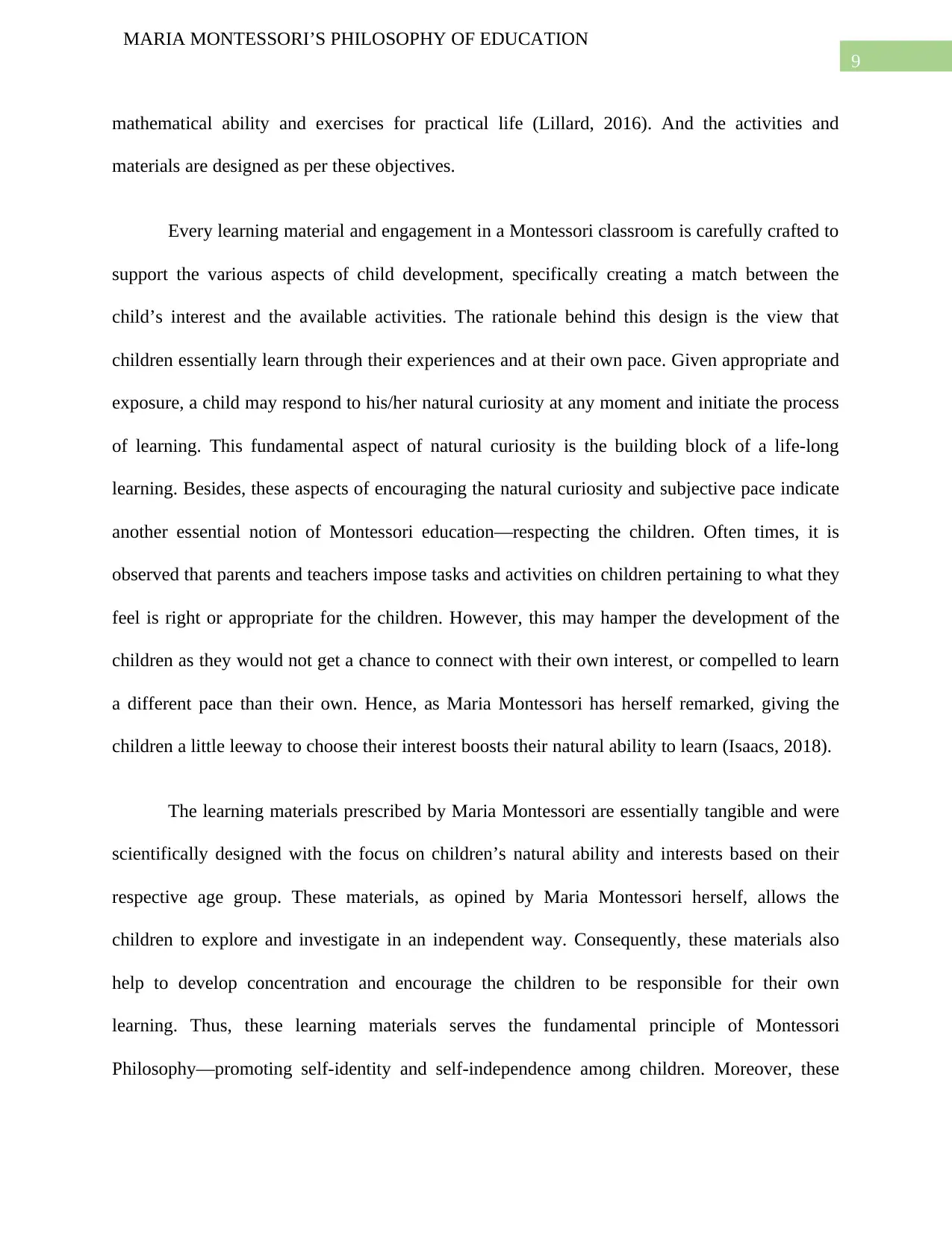
9
MARIA MONTESSORI’S PHILOSOPHY OF EDUCATION
mathematical ability and exercises for practical life (Lillard, 2016). And the activities and
materials are designed as per these objectives.
Every learning material and engagement in a Montessori classroom is carefully crafted to
support the various aspects of child development, specifically creating a match between the
child’s interest and the available activities. The rationale behind this design is the view that
children essentially learn through their experiences and at their own pace. Given appropriate and
exposure, a child may respond to his/her natural curiosity at any moment and initiate the process
of learning. This fundamental aspect of natural curiosity is the building block of a life-long
learning. Besides, these aspects of encouraging the natural curiosity and subjective pace indicate
another essential notion of Montessori education—respecting the children. Often times, it is
observed that parents and teachers impose tasks and activities on children pertaining to what they
feel is right or appropriate for the children. However, this may hamper the development of the
children as they would not get a chance to connect with their own interest, or compelled to learn
a different pace than their own. Hence, as Maria Montessori has herself remarked, giving the
children a little leeway to choose their interest boosts their natural ability to learn (Isaacs, 2018).
The learning materials prescribed by Maria Montessori are essentially tangible and were
scientifically designed with the focus on children’s natural ability and interests based on their
respective age group. These materials, as opined by Maria Montessori herself, allows the
children to explore and investigate in an independent way. Consequently, these materials also
help to develop concentration and encourage the children to be responsible for their own
learning. Thus, these learning materials serves the fundamental principle of Montessori
Philosophy—promoting self-identity and self-independence among children. Moreover, these
MARIA MONTESSORI’S PHILOSOPHY OF EDUCATION
mathematical ability and exercises for practical life (Lillard, 2016). And the activities and
materials are designed as per these objectives.
Every learning material and engagement in a Montessori classroom is carefully crafted to
support the various aspects of child development, specifically creating a match between the
child’s interest and the available activities. The rationale behind this design is the view that
children essentially learn through their experiences and at their own pace. Given appropriate and
exposure, a child may respond to his/her natural curiosity at any moment and initiate the process
of learning. This fundamental aspect of natural curiosity is the building block of a life-long
learning. Besides, these aspects of encouraging the natural curiosity and subjective pace indicate
another essential notion of Montessori education—respecting the children. Often times, it is
observed that parents and teachers impose tasks and activities on children pertaining to what they
feel is right or appropriate for the children. However, this may hamper the development of the
children as they would not get a chance to connect with their own interest, or compelled to learn
a different pace than their own. Hence, as Maria Montessori has herself remarked, giving the
children a little leeway to choose their interest boosts their natural ability to learn (Isaacs, 2018).
The learning materials prescribed by Maria Montessori are essentially tangible and were
scientifically designed with the focus on children’s natural ability and interests based on their
respective age group. These materials, as opined by Maria Montessori herself, allows the
children to explore and investigate in an independent way. Consequently, these materials also
help to develop concentration and encourage the children to be responsible for their own
learning. Thus, these learning materials serves the fundamental principle of Montessori
Philosophy—promoting self-identity and self-independence among children. Moreover, these
Paraphrase This Document
Need a fresh take? Get an instant paraphrase of this document with our AI Paraphraser
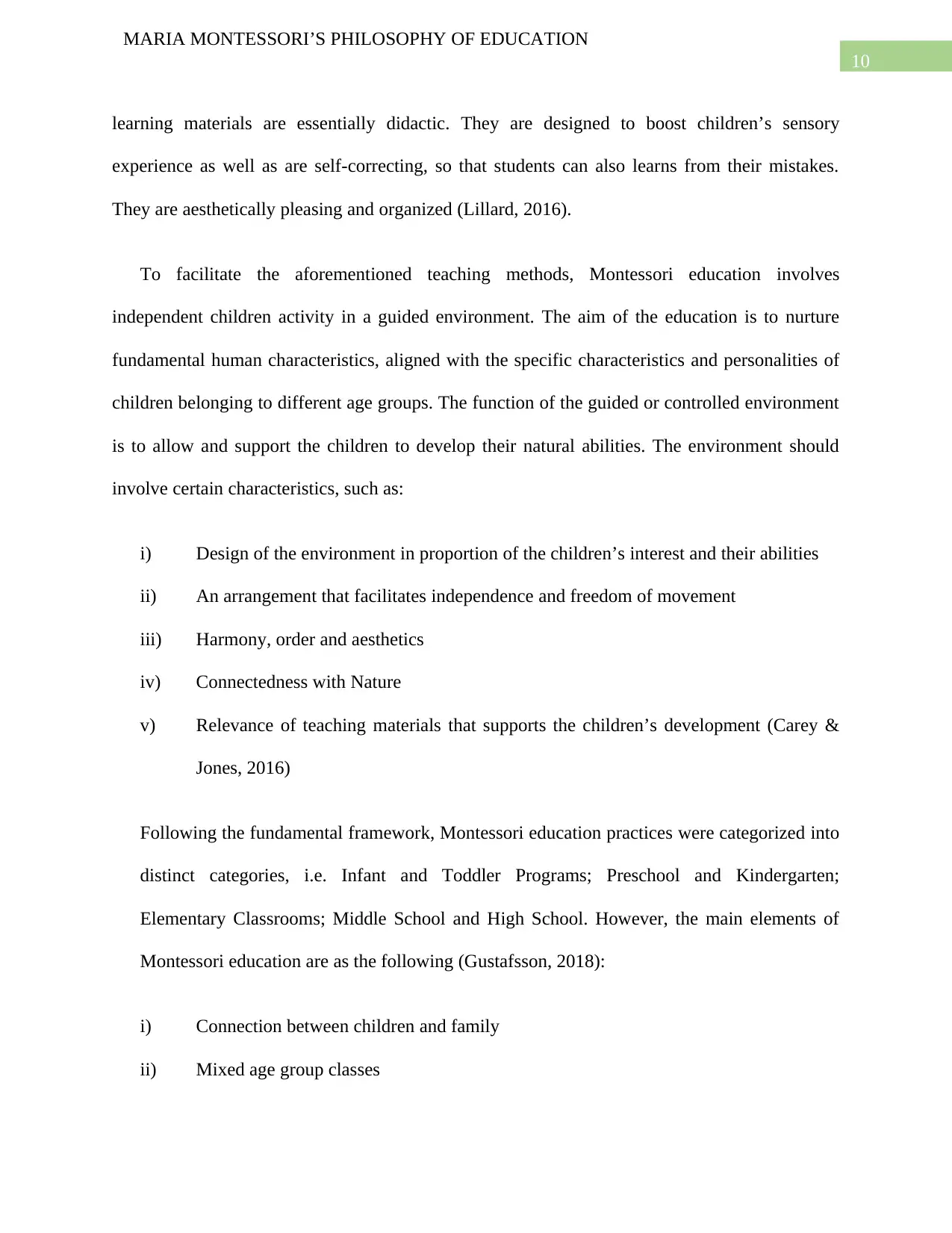
10
MARIA MONTESSORI’S PHILOSOPHY OF EDUCATION
learning materials are essentially didactic. They are designed to boost children’s sensory
experience as well as are self-correcting, so that students can also learns from their mistakes.
They are aesthetically pleasing and organized (Lillard, 2016).
To facilitate the aforementioned teaching methods, Montessori education involves
independent children activity in a guided environment. The aim of the education is to nurture
fundamental human characteristics, aligned with the specific characteristics and personalities of
children belonging to different age groups. The function of the guided or controlled environment
is to allow and support the children to develop their natural abilities. The environment should
involve certain characteristics, such as:
i) Design of the environment in proportion of the children’s interest and their abilities
ii) An arrangement that facilitates independence and freedom of movement
iii) Harmony, order and aesthetics
iv) Connectedness with Nature
v) Relevance of teaching materials that supports the children’s development (Carey &
Jones, 2016)
Following the fundamental framework, Montessori education practices were categorized into
distinct categories, i.e. Infant and Toddler Programs; Preschool and Kindergarten;
Elementary Classrooms; Middle School and High School. However, the main elements of
Montessori education are as the following (Gustafsson, 2018):
i) Connection between children and family
ii) Mixed age group classes
MARIA MONTESSORI’S PHILOSOPHY OF EDUCATION
learning materials are essentially didactic. They are designed to boost children’s sensory
experience as well as are self-correcting, so that students can also learns from their mistakes.
They are aesthetically pleasing and organized (Lillard, 2016).
To facilitate the aforementioned teaching methods, Montessori education involves
independent children activity in a guided environment. The aim of the education is to nurture
fundamental human characteristics, aligned with the specific characteristics and personalities of
children belonging to different age groups. The function of the guided or controlled environment
is to allow and support the children to develop their natural abilities. The environment should
involve certain characteristics, such as:
i) Design of the environment in proportion of the children’s interest and their abilities
ii) An arrangement that facilitates independence and freedom of movement
iii) Harmony, order and aesthetics
iv) Connectedness with Nature
v) Relevance of teaching materials that supports the children’s development (Carey &
Jones, 2016)
Following the fundamental framework, Montessori education practices were categorized into
distinct categories, i.e. Infant and Toddler Programs; Preschool and Kindergarten;
Elementary Classrooms; Middle School and High School. However, the main elements of
Montessori education are as the following (Gustafsson, 2018):
i) Connection between children and family
ii) Mixed age group classes
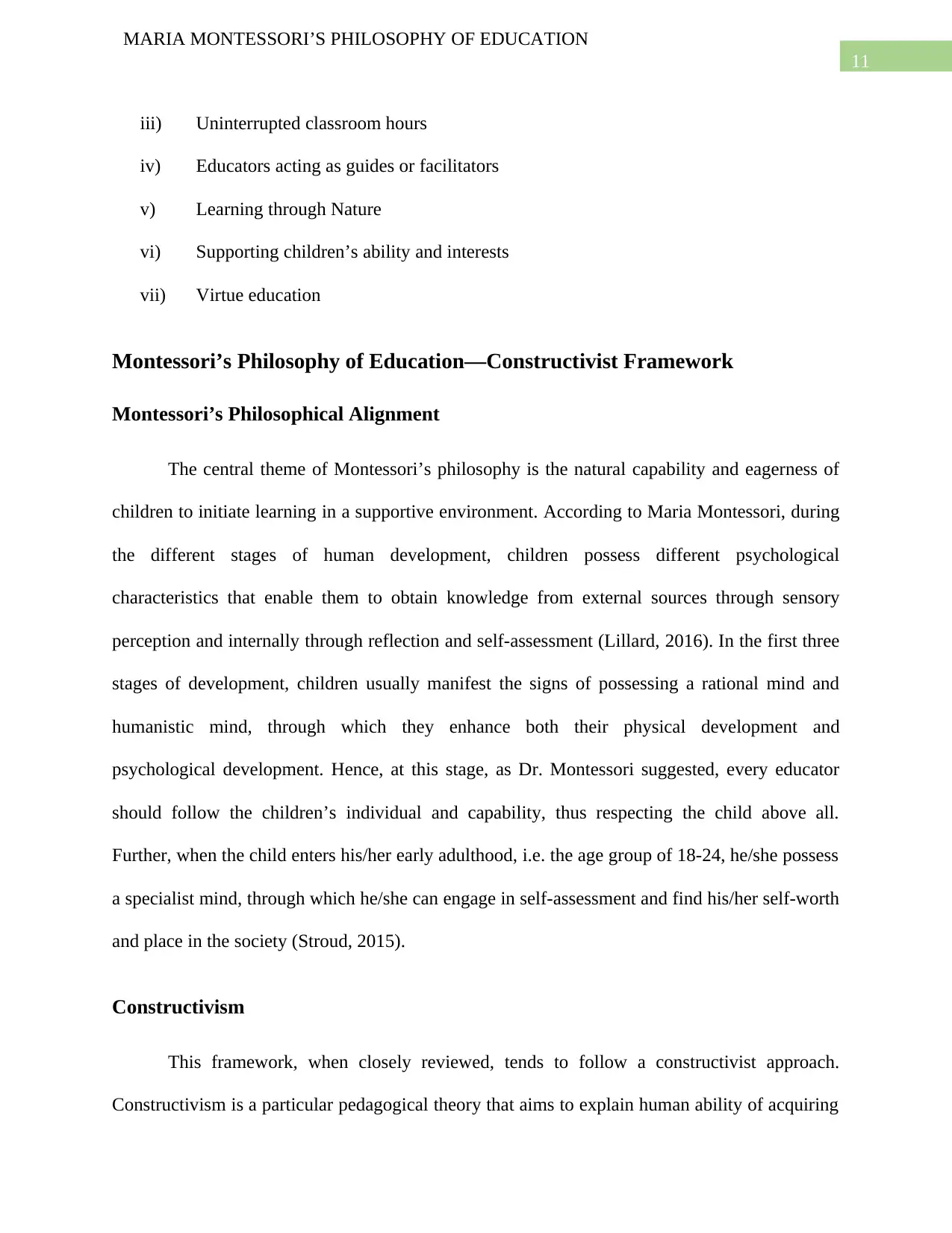
11
MARIA MONTESSORI’S PHILOSOPHY OF EDUCATION
iii) Uninterrupted classroom hours
iv) Educators acting as guides or facilitators
v) Learning through Nature
vi) Supporting children’s ability and interests
vii) Virtue education
Montessori’s Philosophy of Education—Constructivist Framework
Montessori’s Philosophical Alignment
The central theme of Montessori’s philosophy is the natural capability and eagerness of
children to initiate learning in a supportive environment. According to Maria Montessori, during
the different stages of human development, children possess different psychological
characteristics that enable them to obtain knowledge from external sources through sensory
perception and internally through reflection and self-assessment (Lillard, 2016). In the first three
stages of development, children usually manifest the signs of possessing a rational mind and
humanistic mind, through which they enhance both their physical development and
psychological development. Hence, at this stage, as Dr. Montessori suggested, every educator
should follow the children’s individual and capability, thus respecting the child above all.
Further, when the child enters his/her early adulthood, i.e. the age group of 18-24, he/she possess
a specialist mind, through which he/she can engage in self-assessment and find his/her self-worth
and place in the society (Stroud, 2015).
Constructivism
This framework, when closely reviewed, tends to follow a constructivist approach.
Constructivism is a particular pedagogical theory that aims to explain human ability of acquiring
MARIA MONTESSORI’S PHILOSOPHY OF EDUCATION
iii) Uninterrupted classroom hours
iv) Educators acting as guides or facilitators
v) Learning through Nature
vi) Supporting children’s ability and interests
vii) Virtue education
Montessori’s Philosophy of Education—Constructivist Framework
Montessori’s Philosophical Alignment
The central theme of Montessori’s philosophy is the natural capability and eagerness of
children to initiate learning in a supportive environment. According to Maria Montessori, during
the different stages of human development, children possess different psychological
characteristics that enable them to obtain knowledge from external sources through sensory
perception and internally through reflection and self-assessment (Lillard, 2016). In the first three
stages of development, children usually manifest the signs of possessing a rational mind and
humanistic mind, through which they enhance both their physical development and
psychological development. Hence, at this stage, as Dr. Montessori suggested, every educator
should follow the children’s individual and capability, thus respecting the child above all.
Further, when the child enters his/her early adulthood, i.e. the age group of 18-24, he/she possess
a specialist mind, through which he/she can engage in self-assessment and find his/her self-worth
and place in the society (Stroud, 2015).
Constructivism
This framework, when closely reviewed, tends to follow a constructivist approach.
Constructivism is a particular pedagogical theory that aims to explain human ability of acquiring
⊘ This is a preview!⊘
Do you want full access?
Subscribe today to unlock all pages.

Trusted by 1+ million students worldwide
1 out of 18
Related Documents
Your All-in-One AI-Powered Toolkit for Academic Success.
+13062052269
info@desklib.com
Available 24*7 on WhatsApp / Email
![[object Object]](/_next/static/media/star-bottom.7253800d.svg)
Unlock your academic potential
Copyright © 2020–2025 A2Z Services. All Rights Reserved. Developed and managed by ZUCOL.




